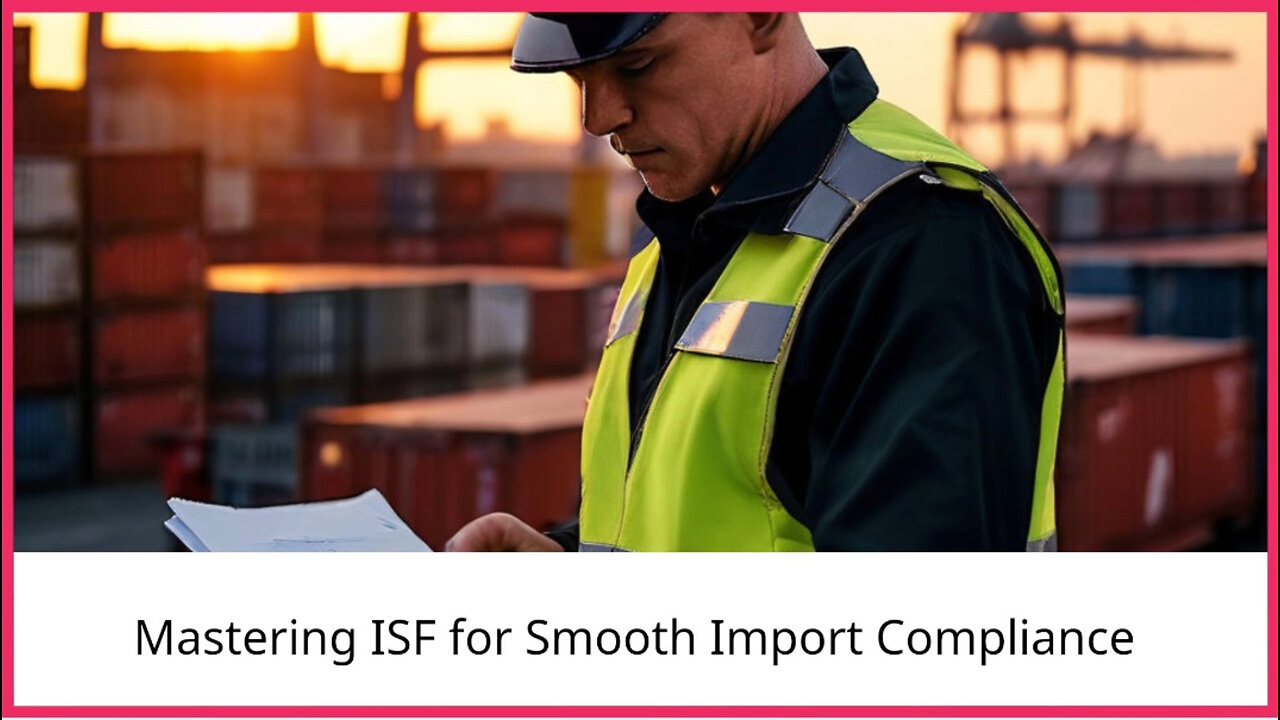Premium Only Content

Mastering Importer Security Filing: The Building Block of Import Compliance
ISF Template | 562-453-7357 | isf@isftemplate.com | www.isftemplate.com
Import compliance is crucial in customs brokerage, and one of its vital aspects is the Customs Bond. A Customs Bond serves as a financial guarantee that ensures the payment of applicable customs duties, taxes, and fees by the importer. It acts as an insurance policy for the government in case of non-compliance issues or violations.
The Importer Security Filing (ISF) is an essential component of the customs clearance process. It requires importers to provide specific information about the cargo being imported before its arrival in the United States. The ISF must be filed electronically and submitted to US Customs and Border Protection (CBP) at least 24 hours before the cargo is loaded onto a vessel destined for the United States.
The primary purpose of the ISF is to enhance security measures and allow CBP to identify high-risk shipments before their arrival. By receiving advance information, CBP can analyze the data and identify potential security risks associated with the cargo. This enables them to allocate resources effectively and prioritize inspections based on risk assessment.
The ISF mandates importers to provide various information, including shipper and consignee details, seller and buyer details, container stuffing location, and the list of goods being shipped. Information about the vessel, such as its operator, voyage number, and port of lading, is also required. Collectively, this information aids CBP in conducting risk assessments and ensuring compliance with legal requirements.
Non-compliance with ISF requirements can have severe consequences. Failure to file, filing incorrect, or incomplete ISFs can result in penalties or clearance refusal by CBP. Moreover, it can lead to delays and additional costs for importers. Importers must understand the significance of timely and accurate ISF filing to avoid these costly issues.
To ensure compliance with ISF requirements, it is beneficial for importers to engage the services of a reliable customs brokerage firm. Customs brokers possess expertise in navigating the intricacies of customs regulations and can assist importers in preparing and filing ISFs accurately. They also provide valuable advice on other customs-related matters, including classification, valuation, and documentation requirements.
In conclusion, the Importer Security Filing (ISF) serves as the building block of import compliance in customs brokerage. Customs Bonds play a vital role in ensuring the payment of customs duties, taxes, and fees. Timely and accurate ISF filing is crucial for importers to avoid penalties, clearance refusals, delays, and additional costs. Partnering with a reliable customs brokerage firm can help importers navigate the complexities of customs regulations and ensure compliance with ISF requirements and other customs-related matters.
#usimportbond #isfcustomsbroker #uscustomsclearing #isfentry
Video Disclaimer Here: This video is designed for education and is unaffiliated with US government bodies.
0:30 - Customs Bond A crucial aspect of import compliance, the Customs Bond is a financial guarantee ensuring the payment of customs duties, taxes, and fees by the importer, serving as insurance for the government in case of violations.
0:50 - Importer Security Filing (ISF) An essential component of customs clearance, ISF requires importers to provide specific cargo information electronically to CBP at least 24 hours before the cargo is loaded onto a vessel for the United States, enhancing security measures and risk assessment.
1:06 - ISF Information Importers must provide details like shipper, consignee, seller, buyer, container stuffing location, and goods list, aiding CBP in conducting risk assessments and ensuring legal compliance for the cargo.
-
 DVR
DVR
vivafrei
2 hours agoBernie Gets DESTROYED! Confirmation Hearings RECAP! D.C. Aviation Disaster & MORE!
22.1K47 -
 1:34:42
1:34:42
The Quartering
3 hours agoNew Crash Footage PROVES Whose At Fault, Air Traffic Control Exposed, RFK Blasted, AI Issues
68.3K29 -
 4:56:18
4:56:18
Right Side Broadcasting Network
23 hours agoLIVE REPLAY: WH Press Secretary Holds Press Briefing and Pres. Trump Signs Executive Orders 1/31/25
209K74 -
 LIVE
LIVE
Dr Disrespect
4 hours ago🔴LIVE - DR DISRESPECT - PUBG - WHAT WINNING LOOKS LIKE
5,510 watching -
 LIVE
LIVE
Twins Pod
15 hours agoThe Q Anon Shaman EXPOSES The Truth of J6! | Twins Pod - Episode 50 - The Q Shaman
2,395 watching -
 1:02:51
1:02:51
PMG
17 hours ago $0.21 earnedRFK, Immigration & DeepSeek
3.46K -
 LIVE
LIVE
Scammer Payback
1 hour agoCalling Scammers Live
510 watching -
 1:33:14
1:33:14
Simply Bitcoin
4 hours ago $2.31 earnedMicroStrategy PROVES You're Not BULLISH Enough On Bitcoin| EP 1172
45.2K1 -
 1:58:05
1:58:05
The Charlie Kirk Show
4 hours agoGetting Them All Confirmed + DEI in the Air | Smith, Means | 1.31.2025
120K29 -
 13:19
13:19
Misha Petrov
3 hours agoDISGUSTING! TikTok Leftists MOCK RFK Jr.’s Disorder While He EXPOSES Big Pharma
24.5K25